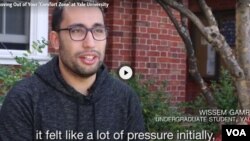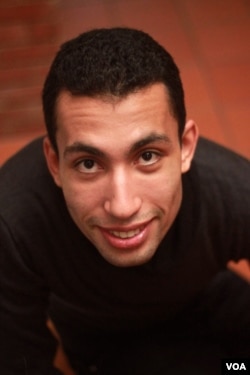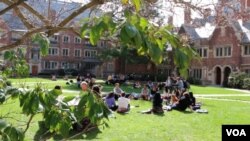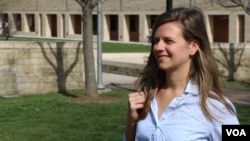When Wissem Gamra walked through the gates of Yale University, he was the first undergraduate from Tunisia in the school's 317-year history.
“Sometimes people, when I tell them where I’m from, people would not know where it is," he explains. "And I take that as a good teaching opportunity, to teach them more about Tunisia.”
Like many international students, Gamra has been eager to learn, as well as teach, about culture. Like many students who travel abroad, he blogged that in high school he studied math, physics, computer science and Chinese, because Tunisians "are really interested in languages."
He added a cultural note, as well.
"Contrary to what most people think, Tunisians are not terrorists," he wrote on the Connect Youth, Connect Africa blog site. "They are really friendly actually: We are known by our hospitality, and how we take care of our guests. Some of our traditional dishes are couscous, and baklawa. Please make sure to come and visit us!"
Tunisia is a Muslim country, and Gamra faced some difficulties in dealing with the cultural differences in the U.S. While drinking alcohol is common for many American college students, Islam has strong rules against drinking alcohol.
Gamra came to Yale and the U.S. in 2014 from the African Leadership Academy, a school in Johannesburg, South Africa. It trains students from across the continent about leadership and problem-solving so they can bring those skills back to solve issues in Africa. It helps students apply to top universities around the world and secure financial aid.
Gamra studies electrical engineering at Yale. Established in 1701, the university carries the Ivy League name, meaning it is one of eight private colleges and universities in the northeastern United States widely considered to be among the best in the world. Five former U.S. presidents graduated from Yale.
Ivy League schools accept a very small number of students that apply, and they often cost the most to attend. Gamra received what’s called a full-ride at Yale, meaning the university has given him enough financial aid to cover all his expenses. Only the smartest and most qualified students receive full rides.
Gamra says he has found moments in which he is the student. But he has also found moments where he is the teacher.
He says some Americans have misconceptions about less developed or less wealthy countries. During his first year at Yale, Gamra went to dinner with the parents of one of his American friends. After dinner, his friend’s mother said it was sad how much food is wasted in America while other people starve.
She gave Gamra the leftover food from their meal. Gamra says he thinks she assumed he did not have enough money for food, which he found a little insulting.
Yet Gamra says this was an isolated event. He’s made many American friends and works hard on cross-cultural exchanges on a personal level. He also joined different organizations at Yale. He is a member of Bulldogs Racing, a student group that spends a year building a Formula SAE racing car to race against other universities.
Gamra joined Bulldog Productions, too, an undergraduate student-run film and theater group. He says he did nothing related to theater before coming to the U.S., but he started designing sets when he joined in his first year. By fall 2016, he says, he was the lead producer of a student-written musical theater production called “Drakorian.”
He never would have dreamed of doing these things at a university in his home country, he says. In Tunisia, an electrical engineering student takes lessons in electric engineering and little else.
Gamra isn't the only student who was drawn to Yale because of their broad educational focus.
Melissa Castera is studying for her master’s degree in environmental management at Yale. From Santo, Uruguay, Castera earned her undergraduate degree in civil engineering from the University of the Republic in Montevideo in 2008. In 2015, she decided she wanted to have an international experience to expand her understanding of the world.
Castera earned a Fulbright scholarship, awarded by the U.S. Department of State, that funds cross-cultural exchanges for Americans and internationals.
She says her friends were shocked. Studying abroad is uncommon for students from Uruguay, Castera says.
“They were all very surprised that this was happening. … When I would say ‘Yale,’ they’d say, ‘Wow. How did you get into that? We are a so small country. Do they know where is Uruguay?’
Castera says she has welcomed the difficult coursework. She had learned much about planning cities and development during her undergraduate studies. She studies environmental management because she wants to learn more about the security of water resources, she says. Her program at Yale has opened new avenues of learning, including politics and economics.
By examining other fields of study, she has had to think in ways she never had before, she says, pushing her out of her comfort zone. She has to make presentations and speak publicly. She can express herself better in English and in Spanish, she says.
Yale also has given Castera the opportunity to see the world through fresh eyes. As part of her program, the school required her to work in an internship. Last summer, she joined the World Resources Institute to research water usage in Brazil. In spring 2017, she traveled with the school to Israel and Palestine to study how neighboring countries deal with water disputes.
After graduation, Castera wants to solve problems related to climate change, she says, something she knew little about before coming to Yale.
Please leave a comment here, and visit us on Facebook, Twitter, Instagram and LinkedIn, thanks!
“Sometimes people, when I tell them where I’m from, people would not know where it is," he explains. "And I take that as a good teaching opportunity, to teach them more about Tunisia.”
Like many international students, Gamra has been eager to learn, as well as teach, about culture. Like many students who travel abroad, he blogged that in high school he studied math, physics, computer science and Chinese, because Tunisians "are really interested in languages."
He added a cultural note, as well.
"Contrary to what most people think, Tunisians are not terrorists," he wrote on the Connect Youth, Connect Africa blog site. "They are really friendly actually: We are known by our hospitality, and how we take care of our guests. Some of our traditional dishes are couscous, and baklawa. Please make sure to come and visit us!"
Tunisia is a Muslim country, and Gamra faced some difficulties in dealing with the cultural differences in the U.S. While drinking alcohol is common for many American college students, Islam has strong rules against drinking alcohol.
Gamra came to Yale and the U.S. in 2014 from the African Leadership Academy, a school in Johannesburg, South Africa. It trains students from across the continent about leadership and problem-solving so they can bring those skills back to solve issues in Africa. It helps students apply to top universities around the world and secure financial aid.
Gamra studies electrical engineering at Yale. Established in 1701, the university carries the Ivy League name, meaning it is one of eight private colleges and universities in the northeastern United States widely considered to be among the best in the world. Five former U.S. presidents graduated from Yale.
Ivy League schools accept a very small number of students that apply, and they often cost the most to attend. Gamra received what’s called a full-ride at Yale, meaning the university has given him enough financial aid to cover all his expenses. Only the smartest and most qualified students receive full rides.
Gamra says he has found moments in which he is the student. But he has also found moments where he is the teacher.
He says some Americans have misconceptions about less developed or less wealthy countries. During his first year at Yale, Gamra went to dinner with the parents of one of his American friends. After dinner, his friend’s mother said it was sad how much food is wasted in America while other people starve.
She gave Gamra the leftover food from their meal. Gamra says he thinks she assumed he did not have enough money for food, which he found a little insulting.
Yet Gamra says this was an isolated event. He’s made many American friends and works hard on cross-cultural exchanges on a personal level. He also joined different organizations at Yale. He is a member of Bulldogs Racing, a student group that spends a year building a Formula SAE racing car to race against other universities.
Gamra joined Bulldog Productions, too, an undergraduate student-run film and theater group. He says he did nothing related to theater before coming to the U.S., but he started designing sets when he joined in his first year. By fall 2016, he says, he was the lead producer of a student-written musical theater production called “Drakorian.”
He never would have dreamed of doing these things at a university in his home country, he says. In Tunisia, an electrical engineering student takes lessons in electric engineering and little else.
Gamra isn't the only student who was drawn to Yale because of their broad educational focus.
Melissa Castera is studying for her master’s degree in environmental management at Yale. From Santo, Uruguay, Castera earned her undergraduate degree in civil engineering from the University of the Republic in Montevideo in 2008. In 2015, she decided she wanted to have an international experience to expand her understanding of the world.
Castera earned a Fulbright scholarship, awarded by the U.S. Department of State, that funds cross-cultural exchanges for Americans and internationals.
She says her friends were shocked. Studying abroad is uncommon for students from Uruguay, Castera says.
“They were all very surprised that this was happening. … When I would say ‘Yale,’ they’d say, ‘Wow. How did you get into that? We are a so small country. Do they know where is Uruguay?’
Castera says she has welcomed the difficult coursework. She had learned much about planning cities and development during her undergraduate studies. She studies environmental management because she wants to learn more about the security of water resources, she says. Her program at Yale has opened new avenues of learning, including politics and economics.
By examining other fields of study, she has had to think in ways she never had before, she says, pushing her out of her comfort zone. She has to make presentations and speak publicly. She can express herself better in English and in Spanish, she says.
Yale also has given Castera the opportunity to see the world through fresh eyes. As part of her program, the school required her to work in an internship. Last summer, she joined the World Resources Institute to research water usage in Brazil. In spring 2017, she traveled with the school to Israel and Palestine to study how neighboring countries deal with water disputes.
After graduation, Castera wants to solve problems related to climate change, she says, something she knew little about before coming to Yale.
Please leave a comment here, and visit us on Facebook, Twitter, Instagram and LinkedIn, thanks!








